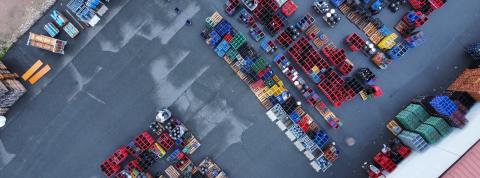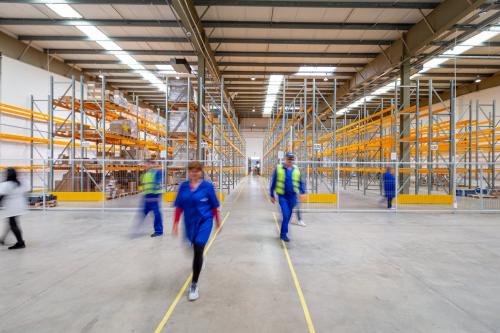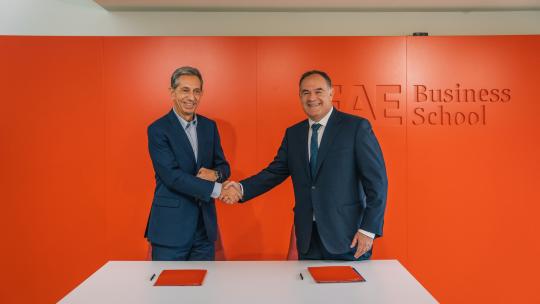
Investments to boost the competitiveness of the industrial sector grow by 43%
Investments to make Spain’s industry and supply chains processes more sustainable are increasing and moving towards the targets set in the European Union’s Agenda 2030. According to the report “Global Supply Chain Challenges” published by EAE Business School, which forms part of the Planeta Formación y Universidades division, Spain will allocate 4.556 billion euros to its industrial policy in 2023, financed by EU funds through the Recovery, Transformation and Resilience Plan, focusing on boosting industry, energy efficiency and process digitization. This represents a 43% rise in investment compared to the same program in 2022.
“Investments in sustainability to adapt direct and indirect supply chain processes have grown significantly in both public and private companies, as well as in governments and other organizations”, explains Mireia Ríos, a lecturer EAE Business School and co-author of the report with fellow lecturers Miquel Serracanta and Gustavo Ramírez. “In the majority of cases, these investments are also attracted by emerging clusters created to improve the competitiveness of companies”, added the lecturer.
Spain is home to more than 3 million companies, 5.6% of which form the country’s industrial sector 60% of the business community is concentrated between Catalonia, Madrid, Andalusia and Valencia. “For some time now, one of the biggest challenges faced by companies is improving their management of sustainability in the supply chain, because any related decision has a significant impact on its global scope at all points of the chain”, explains Ríos, adding that “we are currently living in what is known as the ‘decade of action’, in which all the countries that are members of the OECD are committed to the Agenda 2030”.
EAE Business School’s report explains that companies have reconsidered how to tackle sustainability by redesigning their processes, promoting the circular economy and preventing waste. To achieve this, companies increasingly embrace the concept of the Triple Bottom Line, which places sustainability at the point at which three elements converge: society, the environment and the economy. “Despite the great efforts made, there are still plenty of unsustainable processes and consumption models. Therefore, there is a need to integrate sustainability, talent management and digitization into the supply chain. These three pillars are fundamental for identifying weaknesses in the supply chain and converting them into opportunities”, emphasized Ríos. With this in mind, EAE Business School’s report analyses supply chains from this triple perspective: sustainability, talent and digitization.
INCREASING THE SUPPLY OF BATTERIES AND POWER CELLS
The report also shows that, over the next decade, the demand for batteries is expected to increase due to the growing adoption of electric vehicles. According to the European Council, the number of electric vehicles on the roads is expected to rise from 1.8 million in 2019 to 30 million in 2030. This will lead to a huge rise in demand for batteries and the EU aims to lead global production and create a circular and sustainable supply chain to meet this demand.
“One of the challenges identified in EAE Business School’s report is the construction of gigafactories in Europe to achieve energy self-sufficiency in the coming years”, explains Ríos. “The European Commission has set an ambitious goal to become a world leader in the global production of batteries, especially with a view to supplying the automotive market, for which European funding will be crucial for creating gigafactories”, she adds.
The demand for batteries for electric vehicles produced in Europe is expected to reach a total of 1,200 Gwh per year by 2040. A total of 80 gigafactories will be needed with an average capacity of 15 Gwh per year in 2040. However, work is under way to reach a minimum of 40 gigafactories by that year, which would cover just 50% of the base demand of the European market. Spain will have four of these electric vehicle battery factories, located in Sagunto (Valencia), Barcelona, Badajoz and Vitoria.
TALENT ACQUISITION CHALLENGES
The extremely fast changes that companies are undergoing in terms of their supply chain and logistics functions are also having an impact on talent acquisitions. According to the report, there is high demand for professionals trained in data analytics and information management with respect to future, foreseeable and improbable scenarios. “Positions such as planner (of demand, stock, production or supply) will be in the greatest demand in all sectors and countries.”, explains Miquel Serracanta, the Director of the Masters in Supply Chain at EAE Business School Barcelona.
“New technologies to enhance the efficiency of global supply chains require better talent for their effective implementation and management. This generates a need for professional to have increasingly better learning skills in order to quickly adopt the new technologies that emerge”, adds Serracanta.
According to the report, the current state of the market has led to a situation in which, nowadays, candidates have the upper hand in staff recruitment negotiations. “The candidates decide whether or not to apply for an offer, whether or not they are interested in the companies, whether or not to respond to the multiple messages they receive on LinkedIn”, explains Serracanta.
Moreover, the digitization of supply chains processes have enabled a series of global improvements, such as the ability to anticipate potential future impacts and needs, and the implementation of artificial intelligence to streamline execution and avoid human error.
“The digitization of the different supply chains is heterogenous, but all companies strive to achieve the same set of clear goals: gaining an integrated overview, boosting the capacity to automate processes and the corresponding used of data analytics, and alignment with their digital and sustainability strategy”, explains Gustavo Ramírez.


